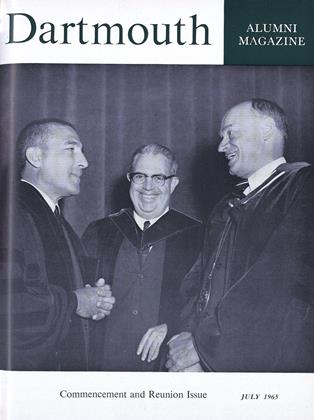ANALYSIS. By Alexander J. McKelway(Great Issues). Richmond, Va.: JohnKnox Press, 1964. 280 pp. $5.50.
Alexander McKelway, who brings the perspective of training in Biblical and theological studies to the Great Issues course in which he is an instructor, has written an important study of the one theologian who has been most concerned to develop a theological critique of our culture and its problems. The book is accurately subtitled "A Review and Analysis." It offers a splendid review of Tillich's notoriously complex and abstract writings.
After an introductory chapter placing Tillich in historical context and a chapter on Tillich's view of the nature of theology, the author devotes a chapter of masterful exposition to each of the five major divisions of Tillich's Systematic Theology: "Reason and Revelation," "Being and God," "Existence and the Christ," "Life and the Spirit," and "History and the Kingdom of God." Each chapter ends with a modest section of analysis and criticism. In these sections the author is especially effective in showing how Tillich's method, his way of ordering his material and interrelating his major points, tends subtly to shape and even bias his content, which Tillich expressly says is to be an exposition of traditional Christian doctrines. A final chapter gives a useful summary of the major points made in the review and of the author's criticisms.
Scholars in the field may want to fault such incidental details as the historical sketch in the first chapter that generalizes about American theology and disregards Jonathan Edwards, Horace Bushnell, "New Haven Theology," the Andover Liberals, and the Social Gospel movement; or they may question the tendency to use the author's own views about theological method as the standard for how theology "must" be done, over against which Tillich's errors become "self-evident"; or they may wish that sheer assertion did not once in a while do service for argument. Nevertheless, for a long time to come this book will be the standard place to turn if you want a brief, readable, accurate report of what Tillich thinks about any theological topic. This scrupulous fairness helps, in part, to account for the astonishing fact that such dissimilar theologians as Karl Barth and Paul Tillich give it enthusiastic notices. That is roughly like writing a book on economic theory that would get rave reviews from both Adam Smith and Karl Marx!
Assistant Professor of Religion
 View Full Issue
View Full Issue
More From This Issue
-
 Feature
FeatureThe Quest for Quality
July 1965 By STEWART LEE UDALL, LL.D. '65 -
 Feature
FeatureSidney Chandler Hayward '26
July 1965 -
 Feature
FeatureChange and Challenge
July 1965 By HAROLD KING DAVISON '15 -
 Feature
FeatureTucker Heads Alumni Council
July 1965 -
 Feature
FeatureAlumni Awards
July 1965 -
 Feature
FeatureHONORARY DEGREE CITATIONS
July 1965
DAVID H. KELSEY
Books
-
 Books
BooksShelflife
Nov/Dec 2007 -
 Books
Books"Old Dartmouth, an Appealing New Trend in College Room Decoration"
December, 1925 By Erville B. Woods -
 Books
BooksGREATER LONDON: THE POLITICS OF METROPOLITAN REFORM.
JUNE 1965 By H. WENTWORTH ELDREDGE '31 -
 Books
BooksCURRENT PROSE: A COLLEGE READER
July 1953 By HERBERT F. WEST '22 -
 Books
BooksZilpah's Boy
JAN./FEB. 1980 By Richard W. Bailey '61 -
 BOOKS
BOOKSUnending Misperception
SEPTEMBER | OCTOBER 2016 By STUART A. REID ’08



